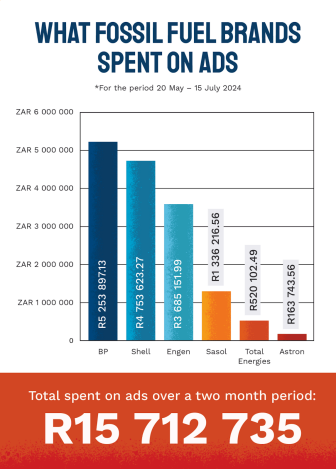The G20 must take a strong stand against greenwashing by fossil fuel companies.
Fossil fuel companies are spending millions to clean up their image, not their emissions. A new report by Fossil Ad Ban (FAB), an initiative of Fossil Free South Africa, shows just how far the industry will go to protect its profits and delay real climate action. The report presents striking evidence of how greenwashing — the use of misleading marketing to appear environmentally responsible — allows some of the world’s most polluting companies to dodge accountability amid an escalating climate crisis.
From 20 May to 15 July 2024, the FAB documented 200 fossil fuel advertisements from six major companies operating in South Africa: Astron Energy, BP, Engen, Sasol, Shell and TotalEnergies. These adverts appeared on five media platforms — outdoor billboards, print publications, online channels, television and radio — saturating the public space with a carefully curated narrative of environmental commitment and community upliftment.
But behind the scenes, these same companies continue to invest in fossil fuel expansion, lobby against environmental regulations and delay the country’s transition to renewable energy.
FAB’s research tracked not only the volume of these advertisements but also how they sought to mislead. The report categorises the ads into competitions, corporate sponsorships, community partnerships, so-called corporate social responsibility initiatives, and promotional specials. In all cases, the aim is the same: to maintain social license, distract from environmental harm and buy time for climate action.
This is not just about advertising. It’s about the power of influence. When polluting industries are allowed to dominate public messaging by framing themselves as green, responsible and even indispensable, it distorts the public’s understanding of the climate crisis and undermines the urgency of real solutions.
Countries such as France and the Netherlands have already taken steps to restrict misleading advertising — greenwashing.
According to its mandate, the G20’s Environmental and Climate Sustainability Working Group has a responsibility to address the environment and climate crisis. Misleading advertising must be banned. By doing so, we will expose harm caused by fossil fuel companies, weaken their industry’s influence and support a fair transition to a cleaner future.

If a ban is implemented, fossil fuel companies understand that can lead to loss of profit through reduced public support because public participation helps fossil fuel companies to maintain influence and legitimacy. The only way to challenge this is through implementing laws and regulations to curb the spread of misinformation.
The FAB report shows that as early as 1965, 20 fossil fuel companies can be directly linked to 35% of all carbon dioxide and methane. The Guardian article lists the 20 companies, which include G20 countries: BP (United Kingdom), Total SA (France), PetroChina, Saudi Aramco (Saudi Arabia), Gazprom (Russia), Petrobras (Brazil) and BHP Billiton (Australia).
The G20’s Environmental and Climate Sustainability Working Group must act immediately and pressure countries o show urgency by implementing fossil fuel bans in their countries.
To truly confront the climate crisis, the G20 must take a firm stand against greenwashing, starting with laws that regulate and ban deceptive advertising by fossil fuel companies.
Lazola Kati is the coordinator for the Fossil Ad Ban campaign, a programme of Fossil Free South Africa.